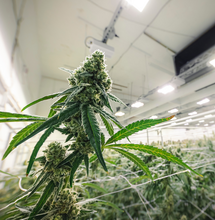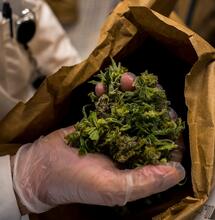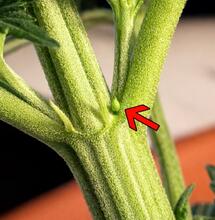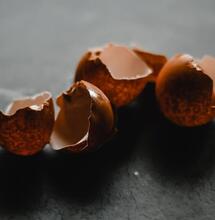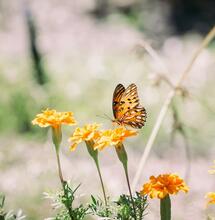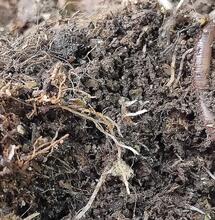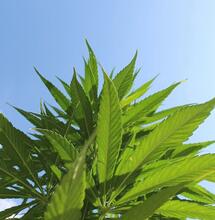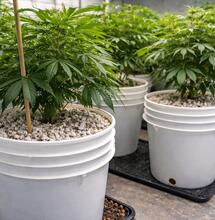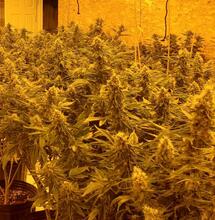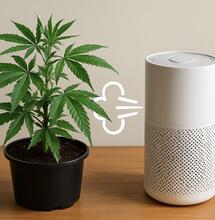Different Types of Natural Fertilizers for Cannabis Plants
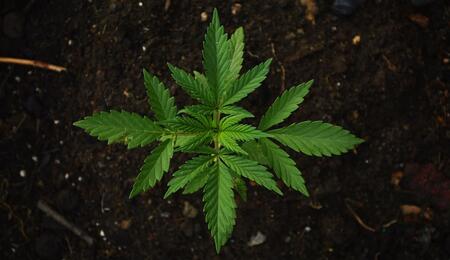
Like other plants, cannabis pulls the nutrients it needs with the roots from the soil. Cannabis plants will grow just fine if the soil is good (and if the climate is suitable, and if there’s sufficient light and water). But growing high-quality weed requires more nutrients - in the form of fertilizers. Let’s find out what are some of the best natural organic feeds you can use for your cannabis garden.
Growing cannabis outdoors typically entails adding nutrient solutions to the soil upon transplanting the plant. While initial dosing of nutrients may be sufficient for the entire life cycle of a plant, some growers additionally top-dress the soil at a later stage.
Indoor growing usually uses liquid nutrients that are administered during watering. Depending on the type of cannabis strain, this could mean nourishing the crops with nutrients and water 1-2 times every week.
If a nutrient deficiency is spotted on the cannabis crops, it may be demanded to boost the plants’ nutrients uptake. It’s also essential to increase the specific nutrients missing from the plant’s food. (Find more information here on how to deal with cannabis nutrient deficiencies).
Nitrogen (N), Phosphorus (P), and Potassium (K) are the three essential foods cannabis needs. In significantly lower quantities, marijuana plants also need Magnesium, Copper, Iron, Magnesium, and similar micronutrients.
Depending on the growth stage, cannabis demands more Nitrogen when vegetating and more bloom nutrients - Phosphorus and Potassium when flowering and budding.
Natural fertilizing solutions are abundant with all types of nutrients a cannabis garden might need. But it’s also good to know what nutrient is contained in each organic supplement. Below is an overview:
- Nitrogen: Bat guano, worm castings, human urine, and chicken manure.
- Phosphorus: Bone and fish meals, banana peels, and rock dust.
- Potassium: Kelp, fish meal, and wood ash.
- Magnesium: Epsom salts and dolomite.
- Calcium: Clay, gypsum, and limestone.
Bat Guano
Who knew that feces from bats or sea birds are a perfectly nutritious solution to fertilize plants with. Bat guano is what you get precisely from this type of poop. A natural fertilizer with all the nutrients a pot plant might need, bat guano is most abundant in Nitrogen (the NPK is at around a 10-3-1 ratio).
Guano is extracted from nitrogen-rich ammonia. The eastern coasts of the Pacific and South America are some of the world’s largest providers of bat guano, as is South America as a whole, Indonesia, and Madagascar.
Widely used among both outdoor and indoor growers, Guano supports cannabis to facilitate from basic functions to rapid green growth, formation of healthy and vigorous roots and stems, and it also assists during flowering.
It’s added as a crop supplement and also functions as a soil conditioner to improve the soil texture. Applied on the leaves, it acts as a fungicide.
An excellent compost activator, Guano also speeds up the natural decomposition of organic compost matter. It naturally balances the soil, cleansing it from toxins. Guano is praised among experienced growers also because it enhances the overall taste of the cannabis buds.
Worm Castings
A common sight in the garden, worms provide high nutrients also for cannabis crops. Worm castings are the leftovers of earthworms digesting soil and other organic matter. Worm castings introduce microorganisms in the ground and are commonly added to compost tea. Using it with compost is in fact the best way to use worm castings, while direct application can result in weed that tastes like worm poop.
Human Urine
Well, at least it’s not your poop. When diluted to a ratio of at least 1 part urine and 10 parts water, your urine comes in handy when you need a source of Nitrogen. Strains such as Durban Poison particularly benefit from human urine.
The NPK ratio of human urine is around 11-1-2 if a person lives in the US or Europe. Urine also contains salts, therefore it must be diluted with water. When growers use pee for potted plants and seedlings, dilution should be done at a ratio of 1:20. If a person is using medications or is suffering from a urinary tract infection, they should not use their wee for their pot. Last of all, don’t feel disgusted about urine. It can’t get worse than poops from bats. Or chicken.
Chicken Manure
Rich in Nitrogen, but it also contains fair amounts of Potassium and Phosphorus; if you have chickens, you can prepare a simple chicken manure solution. This manure is prepared from the bedding of the chickens and is commonly used in gardening.
Chicken manure still needs proper composting in order to break down some of the more powerful nutrients it contains. If applied too raw, it can cause plant damage.
Bone and Fish Meals
If you have fish for lunch, and you know your pot plants are craving some Nitrogen, use the bones and other inedible parts of the fish to prepare a fish meal. Ground the bones into a fine powder, enrich with fish emulsion or pressed fish oil, and apply onto the soil. Alternatively, growers can make use of blood, bone, and soy meal.
Wood Ashes
One solution to increase Potassium and lime for your cannabis plants is to use wood ash. Look no further than the ash in your fireplace to source out this type of fertilizer.
Ash only needs to be lightly scattered on the plants. It can also be added to a compost heap - hardwood trees like oak and maple release more nutrients than other trees. If slugs and snails invade the garden, wood ash can be used to deter them. The ash needs to be kept dry. If it gets wet, the result is contaminating the soil with too many salts. In which case, the salt will need to be flushed out from the ground.
Epsom Salts
Epsom salt is actually magnesium sulfate. It’s the most convenient natural solution to boost magnesium and sulfur for your cannabis crops. With this nutrient, there’s almost no risk of overfeeding.
Epsom salt may look the same as coarse kitchen salt, but molecularly speaking, the two are entirely different products. Pharmacies sell various health and beauty products that contain Epsom salts, such as migraine kits, bath salts, or exfoliators. You don’t need those for your garden. Look for the Epsom salt sold in your local garden store.
Dolomite Limestone
Also known as dololime or dolostone, this is a mineral solution for when cannabis plants need a little boost in calcium. Dolomite lime is also one of the most efficient ways to treat soils that appear acidic. This mineral has a natural pH of 7, and it cannot raise the pH of the soil more than that.
Kelp and Molasses
Who knew seaweed could help you grow your other weed. Kelp is sourced from shallow saltwater near coastal areas and can act as an ideal food resource for fungi when brewing liquid fertilizers such as compost tea. To introduce more bacteria into the concoction, growers opt for molasses or black treacle, which is the dense byproduct of refining sugarcane or sugar beets into sugar.
Compost
Basic gardening skills include preparing compost. Kitchen waste turned into compost can have multiple applications in the garden, and cannabis is no exception. Composting enriches the soil where crops grow. As the organic material decays into the ground, it deposits in the earth all nutrients it contains. Compost is an essential ingredient for preparing compost tea concoctions.
What Ingredients Are Used for Compost Tea?
A majority of growers stir compost, worm castings, fish meal, kelp, and molasses to prepare a liquid tea solution for their cannabis garden. When ready, the tea can be applied directly to the soil or the plant’s foliage.
Healthy compost is the basis for preparing a compost tea successfully. Compost should be rich with microorganisms and nutrients as well as mycelium (fungi) to help facilitate further fungal growth in the tea. Worm castings are also used in the concoction to introduce microorganisms. Fish meals can bolster fungi populations, and molasses are for bacteria.
Find out more about what compost tea is and step-by-step instructions on how to prepare it in this article here.
More from Soft Secrets:
